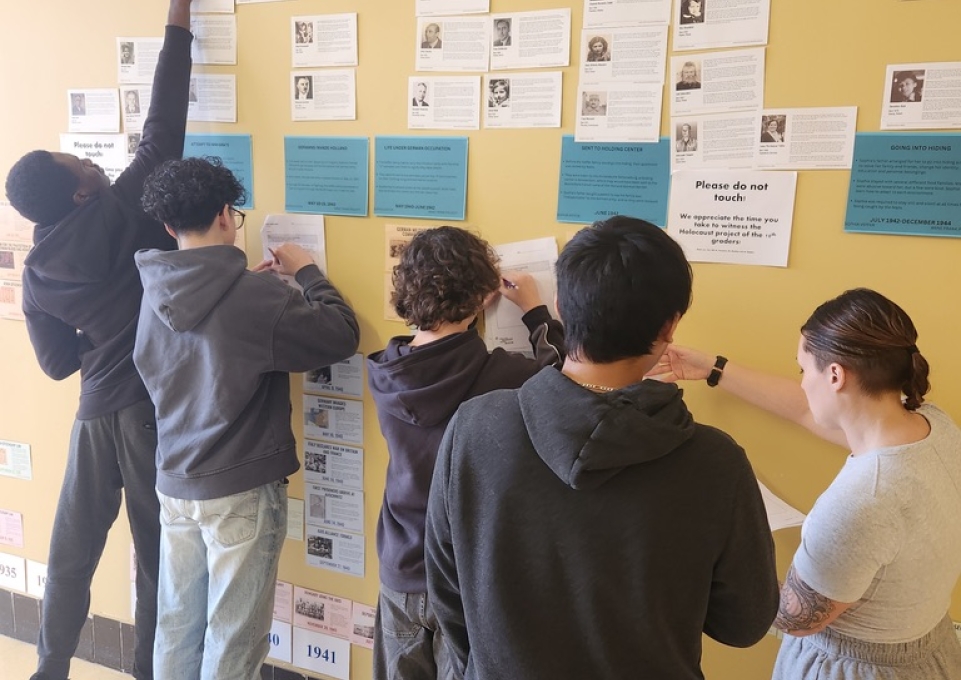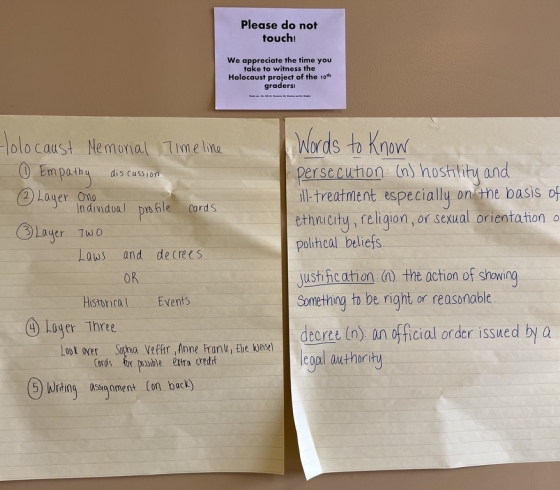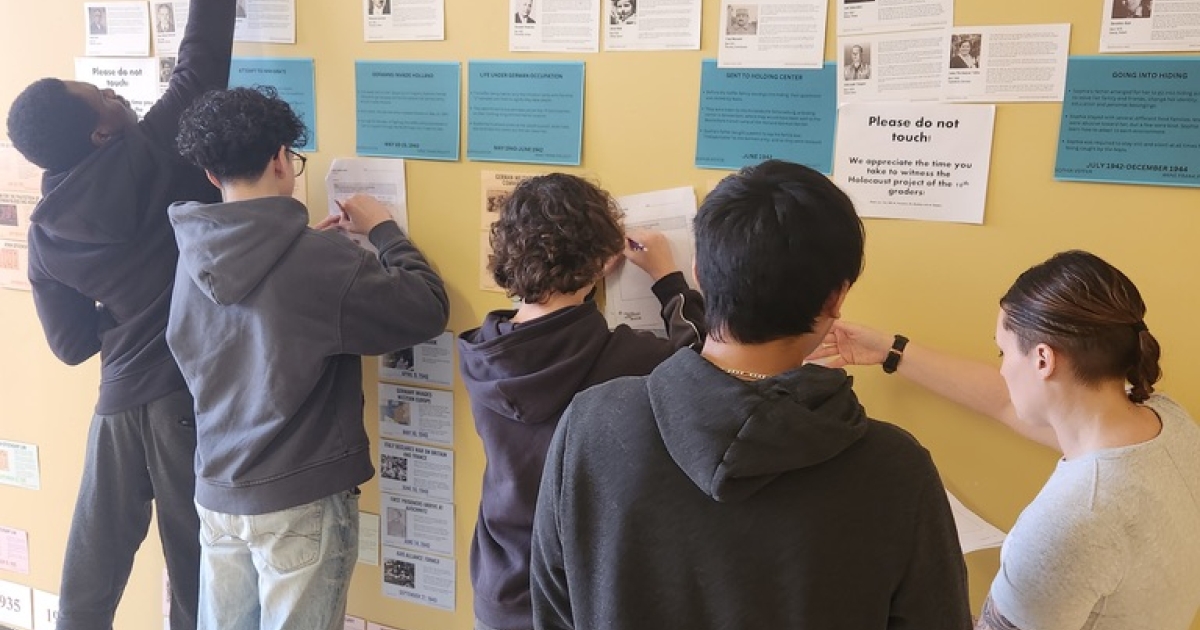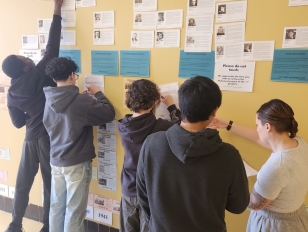
Today’s educators face numerous challenges, not the least of which being how to teach and discuss difficult topics and events—particularly those that may be triggering for students.
High school English as a Second Language teacher Matt Lapennas said he feels equipped to take on such topics, thanks to the training he received from Sophia’s Legacy, a new component of Buffalo State University’s Anne Frank Project that provides Western New York educators with tools to bring lessons about genocide and conflict education into their classrooms.
“Many of my students have experienced trauma, so it is always a fine line to balance between teaching to that experience and not wanting to bring up the pain that they carry,” Lapennas said. “The tools and approach we are developing allow me to teach painful history while giving students the tools they need to process their own pain and trauma. Sophia's Legacy makes it possible to face personal and collective pain together and move toward healing.”
Lapennas is one of six Buffalo Public School teachers who recently completed training as part of the pilot cohort for Sophia’s Legacy. Thanks to a two-year grant from the Vogt Family Foundation at the Community Foundation for Greater Buffalo, the professional development program, named for Holocaust survivor Sophia Veffer, was able to train this cohort at no cost to the district. The Vogt Family Foundation recently granted Sophia’s Legacy an additional two-year grant, which will allow AFP to continue and build upon its initial success with the pilot cohort of teachers and school social workers. The pilot teachers will now train other teachers.
“We are immensely grateful to the Vogt Family Foundation for their continued support for bringing Holocaust, genocide, and conflict education into the classroom,” said Drew Kahn, SUNY Distinguished Service Professor and founding director of the Anne Frank Project. “We have learned so much from our collaborators and are especially indebted to our pilot cohort of teachers and social workers. Teachers need to have more say of what happens in their classrooms. Our job is to provide all the tools and remove all the obstacles for teachers to teach these valuable and challenging lessons.”
Kahn said that while there are many excellent Holocaust and genocide education resources available, there exists a void in how bring these difficult issues into the classroom.

“This isn’t the teachers’ fault; it’s not a traditional part of their education,” Kahn said. “Current research shows the absence of this type of content in the classroom leads to dangerous outcomes with our youth: false narratives, genocide denial, and silence when informed voices are needed most. Sophia’s Legacy provides the tools and vocabulary necessary for teachers to bring the truth about our world’s atrocities into the classrooms and provide platforms for the students to examine these issues in unique and collaborative ways.”
“With the majority of students in Buffalo Public Schools having experienced adverse childhood events themselves, it's important that we approach teaching and learning from a trauma-informed perspective,” added Jeanette Koncikowski, trauma specialist; founder of Thrive Community Counseling; and adjunct professor of psychology at Buffalo State. “Sophia is so much more than the story of what she endured during the Holocaust. Her courage, commitment to truth-telling, and sense of humor help young people see how to survive unthinkable experiences, make meaning from them, and move forward after trauma.”
Sophia’s Legacy came together with the Anne Frank Project in partnership with Buffalo State’s School of Education, the United States Holocaust Memorial Museum, and the Kigali Genocide Memorial in Rwanda, a longtime partner of the Anne Frank Project. In advance of beginning work with the pilot cohort, the training program was developed over a year’s time through a visit to the United States Holocaust Memorial Museum and detailed study of the Rwanda Peace Education Programme, which “promotes social cohesion, positive values—including pluralism and personal responsibility—empathy, critical thinking and action to build a more peaceful society,” along with Pascal Karangwa, director of the Buffalo Rwanda Community Organization.
The training program for teachers includes three major components:
- The content, centered on twentieth- and twenty-first-century genocides and including Veffer’s personal experiences during the Holocaust, presented by United States Holocaust Memorial Museum Fellow Leigh-Anne Hendrick, a teacher at Chautauqua Lake High School.
- Trauma-informed work, for example, how teachers can handle a situation when students deal with emotional triggers, and social media literacy, led by Andrew Hashey, chair and associate professor in Buffalo State’s Exceptional Education Department.
- Story-based learning, an innovative kinesthetic curricular platform that places the student at the center of the experience by taking an approach of simultaneously teaching an academic lesson while also addressing students’ multiple socioemotional needs, taught by Kahn.
“Sophia’s Legacy provides the tools and vocabulary necessary for teachers to bring the truth about our world’s atrocities into the classrooms and provide platforms for the students to examine these issues in unique and collaborative ways.”
Following the training, Sophia’s Legacy team members join the teachers in their classrooms with their students to assist with application.
“I have been in Holocaust and genocide education for over 20 years—teaching students and training teachers—but these past two years have been different,” said Hendrick. “Helping create the framework for Sophia’s Legacy has been one of the most meaningful experiences of my career. The concept is simple: equip a small, passionate group of educators with a framework for teaching hard history, support them with resources, mentorship, and opportunities and then step back and watch.”
With help from the Vogt Foundation, Sophia’s Legacy will soon expand to more schools by paying the pilot teachers to train more teachers.
“We train teachers—not just in content, but in stories and empathy,” Hendrick said. “They, in turn, teach their students. Next year, the original educators become the mentors, guiding a new group of teachers. The ripples continue—spreading knowledge, deepening understanding, and fostering a culture of remembrance, action and empathy.”
“The work of Sophia's Legacy is crucial in addressing conflict resolution in our communities and schools,” said pilot cohort teacher Erin Sheehan, a global studies/special education teacher at Frederick Law Olmsted. “These activities foster discussions and teach empathy. I hope that through these efforts, both my students and I leave the world better than we found it.”
Photos courtesy of Anne Frank Project.



